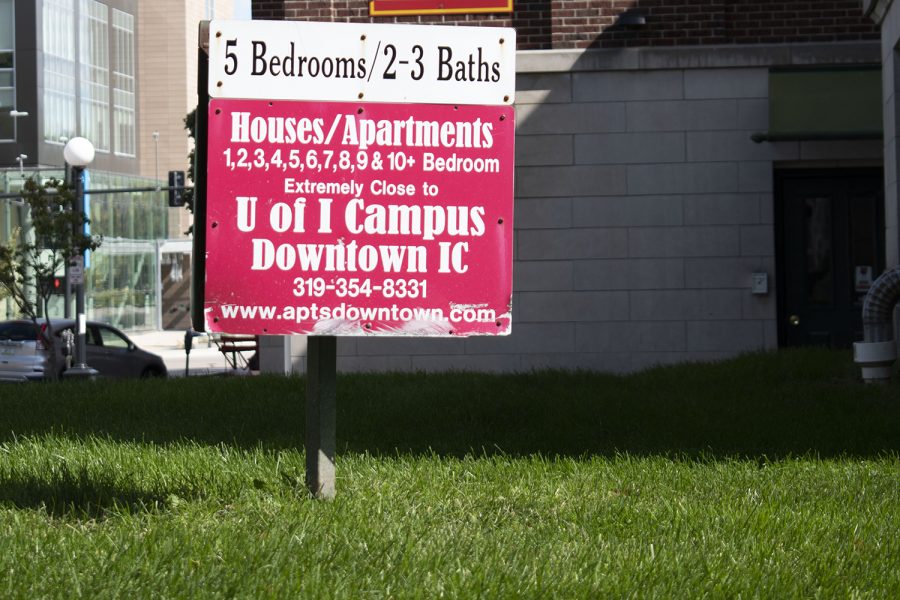UI students discuss the pandemic-tinted rent landscape in Iowa City
Renting in Iowa City has shifted the living situation of many under COVID-19.
Sign seen on South Linn Street on Wednesday, Sept. 30, 2020.
September 30, 2020
As University of Iowa students settle into life in the pandemic, renting remains a relevant topic for those living off campus.
Chad Rhym, UI second-year Ph.D. student in the Department of Sociology and Criminology, said he’s been living in a one-bedroom apartment on the east side since graduating from Morehouse College in Atlanta.
Rhym said he thought about moving into a living situation that would offer him a greater sense of community, but that when an increasing number of COVID-19 cases appeared in Johnson County, he decided to remain in his existing apartment for his second year.
“I actually had this idea where I wanted to live in this medical school frat house thing because I had a friend from Morehouse who lived there and it was super cheap rent, and you know, I just wanted an extra community, and then COVID happened,” Rhym said. “I was just like, whatever, I’m going to renew my lease because I thought it was a lot safer and I knew I had the means to keep up with my rent and whatnot, which I’m grateful for.”
He said he could see himself moving out of his current apartment in an effort to lower what he pays in rent, but that he was concerned about restarting the apartment hunting process while COVID-19 was still a factor.
UI junior Mitch Baumgartner, who is studying informatics, said he lived in an apartment last year, but now rents a house with four other people who split living costs evenly.
He said he subleased his previous apartment in the spring, so he was not around to see how the pandemic affected rent, but said one of the benefits of his new living situation during COVID-19 was that deadlines on payment are a bit more relaxed compared to what he previously experienced.
“I wasn’t in there for spring of 2020, so I didn’t really hear about how COVID-19 affected paying rent because I had someone else move into my spot,” Baumgartner said. “I have no insight on how it would affect a traditional leasing office, but I will say, for an independent private landlord, it’s been pretty lax.”
Baumgartner said he gauges what he pays in rent to what he would pay if he lived in a residence hall on campus, which he said would be more financially demanding than his current living situation.
Cook Appraisals is one of the real estate valuation groups that appraises multiple types of housing primarily in Johnson and Linn County. According to its website, the firm appraises over 300 commercial properties per year.
Managing Partner Rochelle Dietiker said the firm has not been hired to appraise rental properties much over the last six months, so she was unsure of how exactly the pandemic was impacting student rental properties in Iowa City.
She said from what she could tell, however, rent was remaining relatively stable and some landlords had offered tenants enticements in response to the pandemic.
RELATED: University of Iowa students grapple with how, whether to pay rent after classes transition online
“We kind of have had some casual conversations in the last few months with people that we know or that come into contact with us on a day-to-day basis, and they’ve made mention that there’s been some offering of concessions,” Dietiker said. “When I say concessions I mean, you know, offering deals to entice people to rent their properties, and that might mean giving off of rent or dropping the price a little bit.”
She said the firm conducts a study every two years that gives it a more comprehensive understanding of what the local renting market looks like from a wider perspective. Until the group conducts its next study in 2021, she said the next six to 12 months will be up in the air.
“We rely kind of heavily on our study every two years and unfortunately we’re not going to be doing that for a while,” Dietiker said. “I think that study when we do that next fall will be quite telling of what’s happening.”




